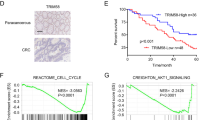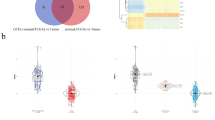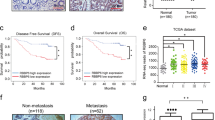Abstract
Background
Breast cancer type 1 susceptibility protein/breast cancer type 2 susceptibility protein-containing complex subunit 3 (BRCC3), a deubiquitinase (DUBs), is overexpressed in various cancers. However, the underlying biological roles of BRCC3 in adenocarcinoma colon (COAD) have yet to be decrypted.
Objective
In this work, we explored the potential biological function of BRCC3 in the natural process of COAD cells.
Methods
The expression levels of BRCC3 in COAD tissues and cell lines were investigated via quantitative real time polymerase chain reaction and western blotting analyses. Meanwhile, short hairpin RNAs targeting BRCC3 (sh-BRCC3) or mesenchymal-epithelial transition factor (MET) (sh-MET) were used to investigate the biological function, including proliferation, apoptosis, migration, invasion, and epithelial–mesenchymal transition (EMT) progression in COAD cells. Furthermore, the expression levels of EMT-related biomarkers were detected with western blotting analysis. Furthermore, we also performed Co-IP assay to identify the correlation between BRCC3 and MET.
Results
BRCC3 expression was increased in COAD tissues and cell lines. ShRNA-mediated downmodulation of BRCC3 in COAD cell lines induced EMT progression. BRCC3 knockdown resulted in decreased migration as well as invasion and increased apoptosis of SW480 and Lovo cells. Besides, MET was regulated by BRCC3 and involved in the migration, invasion, and EMT in SW480 and Lovo cells. Finally, we uncovered that the overexpressed MET reversed the effects of BRCC3 knockdown in COAD cell development.
Conclusions
BRCC3 acted as a critical factor in the development of COAD by deubiquitinating and stabilizing MET, which might provide an emerging biomarker for the therapeutic and diagnosis strategy of COAD.






Similar content being viewed by others
References
Barata-Antunes C, Alves R, Talaia G, Casal M, Geros H, Mans R, Paiva S (2021) Endocytosis of nutrient transporters in fungi: the ART of connecting signaling and trafficking. Comput Struct Biotechnol J 19:1713–1737
Boromand N, Hasanzadeh M, ShahidSales S, Farazestanian M, Gharib M, Fiuji H, Behboodi N, Ghobadi N, Hassanian SM, Ferns GA et al (2018) Clinical and prognostic value of the C-Met/HGF signaling pathway in cervical cancer. J Cell Physiol 233:4490–4496
Bryan S, Masoud H, Weir HK, Woods R, Lockwood G, Smith L, Brierley J, Gospodarowicz M, Badets N (2018) Cancer in Canada: stage at diagnosis. Health Rep 29:21–25
Chebouti I, Kasimir-Bauer S, Buderath P, Wimberger P, Hauch S, Kimmig R, Kuhlmann JD (2017) EMT-like circulating tumor cells in ovarian cancer patients are enriched by platinum-based chemotherapy. Oncotarget 8:48820–48831
Cooper EM, Boeke JD, Cohen RE (2010) Specificity of the BRISC deubiquitinating enzyme is not due to selective binding to Lys63-linked polyubiquitin. J Biol Chem 285:10344–10352
Czyz M (2018) HGF/c-MET signaling in melanocytes and Melanoma. Int J Mol Sci 19
Dongre A, Weinberg RA (2019) New insights into the mechanisms of epithelial-mesenchymal transition and implications for cancer. Nat Rev Mol Cell Biol 20:69–84
Du F, Li X, Feng W, Qiao C, Chen J, Jiang M, Qiu Z, Qian M, Tian D, Nie Y et al (2020) SOX13 promotes colorectal cancer metastasis by transactivating SNAI2 and c-MET. Oncogene 39:3522–3540
Fabregas JC, Ramnaraign B, George TJ (2022) Clinical updates for Colon Cancer Care in 2022. Clin Colorectal Cancer 21:198–203
Fu J, Su X, Li Z, Deng L, Liu X, Feng X, Peng J (2021) HGF/c-MET pathway in cancer: from molecular characterization to clinical evidence. Oncogene 40:4625–4651
Gu YY, Yang M, Zhao M, Luo Q, Yang L, Peng H, Wang J, Huang SK, Zheng ZX, Yuan XH et al (2015) The de-ubiquitinase UCHL1 promotes gastric cancer metastasis via the akt and Erk1/2 pathways. Tumour Biol 36:8379–8387
Harper JW, Elledge SJ (2007) The DNA damage response: ten years after. Mol Cell 28:739–745
Hu Y, Zhang Y, Ding M, Xu R (2021) Long noncoding RNA TMPO-AS1/miR-126-5p/BRCC3 axis accelerates gastric cancer progression and angiogenesis via activating PI3K/Akt/mTOR pathway. J Gastroenterol Hepatol 36:1877–1888
Huang D, Nagata Y, Grossmann V, Radivoyevitch T, Okuno Y, Nagae G, Hosono N, Schnittger S, Sanada M, Przychodzen B et al (2015) BRCC3 mutations in myeloid neoplasms. Haematologica 100:1051–1057
Kallergi G, Markomanolaki H, Giannoukaraki V, Papadaki MA, Strati A, Lianidou ES, Georgoulias V, Mavroudis D, Agelaki S (2009) Hypoxia-inducible factor-1alpha and vascular endothelial growth factor expression in circulating tumor cells of breast cancer patients. Breast Cancer Res 11:R84
Kim HJ (2022) Therapeutic strategies for ovarian Cancer in point of HGF/c-MET targeting. Med (Kaunas) 58
Lawal B, Wang YC, Wu ATH, Huang HS (2021) Pro-oncogenic c-Met/EGFR, Biomarker signatures of the Tumor Microenvironment are clinical and Therapy Response prognosticators in Colorectal Cancer, and therapeutic targets of 3-Phenyl-2H-benzo[e][1,3]-Oxazine-2,4(3H)-Dione derivatives. Front Pharmacol 12:691234
Liew SK, Azmi MN, In L, Awang K, Nagoor NH (2017) Anti-proliferative, apoptotic induction, and anti-migration effects of hemi-synthetic 1’S-1’-acetoxychavicol acetate analogs on MDA-MB-231 breast cancer cells. Drug Des Devel Ther 11:2763–2776
Lu W, Kang Y (2019) Epithelial-mesenchymal plasticity in Cancer Progression and Metastasis. Dev Cell 49:361–374
Lv S, Wang X, Bai X, Ning H, Li Y, Wen H, Lu W, Wang J (2020) Mesenchymal epithelial transition factor regulates tumor necrosis factor-related apoptotic induction ligand resistance in hepatocellular carcinoma cells through down-regulation of cyclin B1. Int J Biochem Cell Biol 128:105844
Malik R, Mambetsariev I, Fricke J, Chawla N, Nam A, Pharaon R, Salgia R (2020) MET receptor in oncology: from biomarker to therapeutic target. Adv Cancer Res 147:259–301
Meyer T, Jahn N, Lindner S, Rohner L, Dolnik A, Weber D, Scheffold A, Kopff S, Paschka P, Gaidzik VI et al (2020) Functional characterization of BRCC3 mutations in acute myeloid leukemia with t(8;21)(q22;q22.1). Leukemia 34:404–415
Miller KD, Nogueira L, Devasia T, Mariotto AB, Yabroff KR, Jemal A, Kramer J, Siegel RL (2022) Cancer treatment and survivorship statistics, 2022. CA Cancer J Clin 72:409–436
Ning Y, Zhang W, Hanna DL, Yang D, Okazaki S, Berger MD, Miyamoto Y, Suenaga M, Schirripa M, El-Khoueiry A et al (2018) Clinical relevance of EMT and stem-like gene expression in circulating tumor cells of metastatic colorectal cancer patients. Pharmacogenomics J 18:29–34
Niu T, De Rosny C, Chautard S, Rey A, Patoli D, Groslambert M, Cosson C, Lagrange B, Zhang Z, Visvikis O et al (2021) NLRP3 phosphorylation in its LRR domain critically regulates inflammasome assembly. Nat Commun 12:5862
Okamoto K, Bartocci C, Ouzounov I, Diedrich JK, Yates JR 3rd, Denchi EL (2013) A two-step mechanism for TRF2-mediated chromosome-end protection. Nature 494:502–505
Paemka L, Mahajan VB, Ehaideb SN, Skeie JM, Tan MC, Wu S, Cox AJ, Sowers LP, Gecz J, Jolly L et al (2015) Seizures are regulated by ubiquitin-specific peptidase 9 X-linked (USP9X), a de-ubiquitinase. PLoS Genet 11:e1005022
Pan J, Qiao Y, Chen C, Zang H, Zhang X, Qi F, Chang C, Yang F, Sun M, Lin S et al (2021) USP5 facilitates non-small cell lung cancer progression through stabilization of PD-L1. Cell Death Dis 12:1051
Pastushenko I, Blanpain C (2019) EMT Transition States during Tumor Progression and Metastasis. Trends Cell Biol 29:212–226
Pothula SP, Xu Z, Goldstein D, Pirola RC, Wilson JS, Apte MV (2020) Targeting HGF/c-MET Axis in Pancreatic Cancer. Int J Mol Sci 21
Py BF, Kim MS, Vakifahmetoglu-Norberg H, Yuan J (2013) Deubiquitination of NLRP3 by BRCC3 critically regulates inflammasome activity. Mol Cell 49:331–338
Raj S, Kesari KK, Kumar A, Rathi B, Sharma A, Gupta PK, Jha SK, Jha NK, Slama P, Roychoudhury S et al (2022) Molecular mechanism(s) of regulation(s) of c-MET/HGF signaling in head and neck cancer. Mol Cancer 21:31
Rokavec M, Horst D, Hermeking H (2017) Cellular Model of Colon cancer progression reveals signatures of mRNAs, miRNA, lncRNAs, and Epigenetic Modifications Associated with Metastasis. Cancer Res 77:1854–1867
Siegel RL, Miller KD, Goding Sauer A, Fedewa SA, Butterly LF, Anderson JC, Cercek A, Smith RA, Jemal A (2020) Colorectal cancer statistics, 2020. CA Cancer J Clin 70:145–164
Song L, Zhang L, Zhou Y, Shao X, Xu Y, Pei D, Wang Q (2022) ORP5 promotes tumor metastasis via stabilizing c-Met in renal cell carcinoma. Cell Death Discov 8:219
Sun ZZ, Zhang T, Ning K, Zhu R, Liu F, Tang SC, Jiang B, Hua D (2016) B7-H3 upregulates BRCC3 expression, antagonizing DNA damage caused by 5-Fu. Oncol Rep 36:231–238
Sung H, Ferlay J, Siegel RL, Laversanne M, Soerjomataram I, Jemal A, Bray F (2021) Global Cancer statistics 2020: GLOBOCAN estimates of incidence and Mortality Worldwide for 36 cancers in 185 countries. CA Cancer J Clin 71:209–249
Sylvester PW (2014) Targeting met mediated epithelial-mesenchymal transition in the treatment of breast cancer. Clin Transl Med 3:30
Tao H, Liao Y, Yan Y, He Z, Zhou J, Wang X, Peng J, Li S, Liu T (2021) BRCC3 promotes tumorigenesis of bladder Cancer by activating the NF-kappaB signaling pathway through targeting TRAF2. Front Cell Dev Biol 9:720349
Vogel JD, Felder SI, Bhama AR, Hawkins AT, Langenfeld SJ, Shaffer VO, Thorsen AJ, Weiser MR, Chang GJ, Lightner AL et al (2022) The American Society of Colon and rectal surgeons Clinical Practice guidelines for the management of Colon cancer. Dis Colon Rectum 65:148–177
Wang S, Qiu J, Liu L, Su C, Qi L, Huang C, Chen X, Zhang Y, Ye Y, Ding Y et al (2020) CREB5 promotes invasiveness and metastasis in colorectal cancer by directly activating MET. J Exp Clin Cancer Res 39:168
Yao JF, Li XJ, Yan LK, He S, Zheng JB, Wang XR, Zhou PH, Zhang L, Wei GB, Sun XJ (2019) Role of HGF/c-Met in the treatment of colorectal cancer with liver metastasis. J Biochem Mol Toxicol 33:e22316
Yilmaz M, Christofori G (2009) EMT, the cytoskeleton, and cancer cell invasion. Cancer Metastasis Rev 28:15–33
Zhang F, Zhou Q (2018) Knockdown of BRCC3 exerts an anti–tumor effect on cervical cancer in vitro. Mol Med Rep 18:4886–4894
Zhang Y, Xia M, Jin K, Wang S, Wei H, Fan C, Wu Y, Li X, Li X, Li G et al (2018) Function of the c-Met receptor tyrosine kinase in carcinogenesis and associated therapeutic opportunities. Mol Cancer 17:45
Zhao R, Cai Z, Li S, Cheng Y, Gao H, Liu F, Wu S, Liu S, Dong Y, Zheng L et al (2017) Expression and clinical relevance of epithelial and mesenchymal markers in circulating tumor cells from colorectal cancer. Oncotarget 8:9293–9302
Acknowledgements
Not applicable.
Funding
This work was supported by Nantong Basic Science Research and Social Livelihood Science and Technology Plan Project (No. MSZ2022041).
Author information
Authors and Affiliations
Corresponding authors
Ethics declarations
Conflict of interest
The authors declare that they have no competing interests.
Additional information
Publisher’s Note
Springer Nature remains neutral with regard to jurisdictional claims in published maps and institutional affiliations.
Rights and permissions
Springer Nature or its licensor (e.g. a society or other partner) holds exclusive rights to this article under a publishing agreement with the author(s) or other rightsholder(s); author self-archiving of the accepted manuscript version of this article is solely governed by the terms of such publishing agreement and applicable law.
About this article
Cite this article
Feng, X., He, S., Chen, Y. et al. Deubiquitinase BRCC3 promotes the migration, invasion and EMT progression of colon adenocarcinoma by stabilizing MET expression. Genes Genom 46, 637–646 (2024). https://doi.org/10.1007/s13258-024-01508-8
Received:
Accepted:
Published:
Issue Date:
DOI: https://doi.org/10.1007/s13258-024-01508-8




